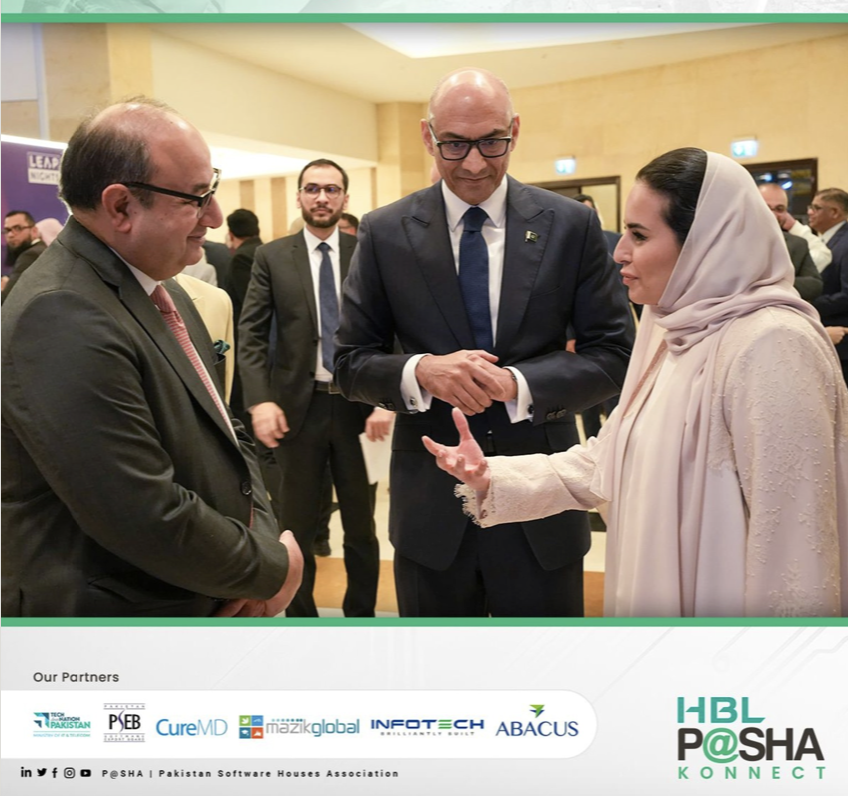We sat down with Sajjad Syed, Chairman of the Pakistan IT Industry Association (PASHA), a man whose career trajectory read like a global adventure. From the arid landscapes of East Africa to the bustling digital hubs of New York, Syed’s journey had been nothing short of transformative. Now, he was poised to lead Pakistan’s IT sector into a new era.
After earning his degree in Computer and Systems Engineering in 1993, he embarked on a global career that took him across continents, from Africa to the Middle East and Europe, working in the energy and IT sectors. Upon returning to Pakistan, he played a pivotal role in shaping the country’s digital infrastructure by working on large-scale government transformation projects, first at PITB and later at PwC. His leadership roles at Oracle and SAP positioned him at the helm of enterprise technology, where he witnessed firsthand the potential of Pakistan’s IT industry.
Watch the complete interview on our YouTube channel
His journey—from being the first employee at the Punjab Information Technology Board (PITB) to leading multinational tech giants like Oracle and SAP, and later founding Excellence Delivered in 2010, epitomizes resilience, ambition, and an unwavering commitment to progress. Starting from a humble one-room office, Syed built a multinational company, now operating in five countries, specializing in cutting-edge technologies like artificial intelligence and IoT. His emphasis on excellence extends beyond projects.
Under his leadership, ExD became a powerhouse in AI, IoT, and enterprise solutions, holding multiple patents and driving innovation at the intersection of technology and business. In a bold move, Syed stepped down as CEO of Excellence Delivered to ensure it transitioned into a professionally managed company. He now serves as Chairman and Chief Innovation Officer, empowering a new generation of leaders to take the company forward. “True success is when a business thrives beyond its founder,” he says, underscoring his belief in long-term sustainability over personal control.

The Blueprint for Pakistan’s IT Future
For Syed, the most fulfilling aspect of his work is taking Pakistani companies and helping them compete on a global stage. “We once worked with an organization in rural Punjab where the finance team didn’t even know how to do double-entry accounting,” he recalls. “Within months, they became the first in their industry worldwide to run the latest version of SAP. That’s the kind of transformation that excites me—turning local businesses into world-class enterprises.”

As Chairman of P@SHA, Syed now carries an even greater responsibility: to champion Pakistan’s IT industry on the global stage. He believes that Pakistan’s IT sector is already competitive on the global stage, yet it remains an “undiscovered treasure” that the world is only now beginning to notice. He envisions a future where Pakistan is not just a services hub but a powerhouse of intellectual property and product development.
“The services market is growing, but the real future lies in building our own technology products. Whoever controls intellectual property controls the future,” he asserts.
A significant part of this transformation is Tech Destination Pakistan, an initiative aimed at branding Pakistan as a premier IT hub. Syed believes this campaign should have begun years ago, but he is now committed to ensuring that it achieves its full potential. “The Prime Minister’s vision of $25 billion in IT exports is achievable,” he asserts. “But to get there, we need structural changes.”

Syed emphasizes that market access must be expanded, both externally and internally. While Pakistan has traditionally looked to markets like the U.S., the Middle East, and Europe, he sees untapped opportunities in Africa and South America. “We are ready to compete in these new markets, but we need a structured strategy to make our presence known.” Internally, he stresses the importance of self-reliance, urging local businesses to prioritize Pakistani-built tech solutions instead of relying on foreign imports. “A dollar saved in Pakistan is a dollar earned for Pakistan.”
Another crucial pillar of his blueprint is infrastructure reliability. “For an industry built on connectivity, the internet is our highway,” Syed explains. “It must be fast, unrestricted, and reliable.” He warns that any barriers to internet access, whether policy-driven or technical, will slow down the sector’s progress and limit its ability to compete with countries like the Philippines, Egypt, and Portugal, which have already positioned themselves as digital outsourcing powerhouses.

Long-term government policies, particularly around taxation and investment incentives, are another area Syed highlights. “We need consistency,” he says. “Multinational companies won’t invest in Pakistan if tax policies change every year. We need a 15-year horizon so businesses can plan for the long run.” Stability, he argues, is what will encourage not only foreign investors but also domestic business giants to invest in IT, much like how Indian conglomerates such as Tata and Birla fueled their country’s tech boom.
Equally vital is skill development. While Pakistan produces over 100,000 IT graduates annually, Syed believes many lack industry readiness. He cites the TechLift program, a successful initiative where 16 technology companies trained 4,000 students, achieving a 90% employment rate.
“The industry should lead these training programs because we know what skills are actually needed. When the private sector trains the workforce, we get people who can contribute from day one.”
He envisions PASHA as a unifying force, catering to the diverse needs of the IT industry, from large corporations to startups, and across various sectors like hardware, outsourcing, and gaming. He is particularly focused on high-growth areas like AI, cybersecurity, e-commerce, and gaming, and advocates for the development of creative skills through collaboration with art schools. “We will be focusing a lot and working with art schools or multidisciplinary institutes across Pakistan to develop that competence,” he stated, recognizing the need for diverse skill sets in the evolving technology landscape. He also notes the need to focus on smaller companies, and their access to capital or remittances.

The Power of Data-Driven Decision-Making
Syed is a firm believer that Pakistan’s IT industry must embrace a data-driven approach to policymaking, investments, and strategic growth. “Decisions must be made on evidence, not assumptions,” he states. Under his leadership, P@SHA has committed to ensuring that every policy recommendation is backed by comprehensive data. “We have the data—our companies generate it every day. But for too long, we haven’t used it effectively to shape policy.”
He highlights an eye-opening revelation from a recent study: 55% of Pakistan’s IT exports go to a single country, yet only 10% of the marketing budget was allocated to that region. “This misalignment is exactly what we need to fix,” he says. “Every dollar misallocated is a missed opportunity for growth.” He added, “We are not just running businesses; we are shaping a nation’s future. Every investment, every initiative must be optimized for maximum impact.”
Moreover, he believes that better use of data can transform government policies. “If we don’t track what industries actually need, we end up training thousands of students in skills with no demand while ignoring the gaps where real opportunities exist.” He stresses that P@SHA’s role is to ensure policy interventions are precise, impactful, and aligned with the industry’s true needs.
The Hunger for Innovation: Pakistan’s Tech Ascent
Syed highlights Pakistan’s unique advantages: its young, English-speaking population and the “hunger” that drives innovation. He believes that by focusing on these strengths and addressing weaknesses, Pakistan can become a global tech leader. His vision for PASHA is to be at the forefront of this transformation, driving innovation, collaboration, and positioning Pakistan as a key player in the global tech arena. He concludes with a call for collaboration and knowledge sharing, emphasizing the importance of developing a national digital strategy to guide Pakistan’s tech future.
“A digital nation strategy needs to be built and developed where as leadership, we need to see where we are going to take our nation when it becomes 100% digital. And the nation that does it well, the nation that focuses on productivity is the nation that’s going to make it! I believe artificial intelligence will impact human learning. It will impact our work unless we harness it and lead it,” he warned, highlighting the need for proactive engagement with emerging technologies.
Syed envisions a globally integrated and inclusive Pakistani IT industry, with equal opportunities for all. He notes the need for reading and self-education. “This is the time when a lot of reading needs to be done, a lot of knowledge has to be acquired and a lot of collaboration needs to happen where we learn from each other,” he adds.
A Call to Action: Time to Lead, Not Complain
For him, legacy isn’t about personal achievements but about impact. Beyond business and technology, Syed speaks candidly about the responsibility of Pakistan’s professionals. “It’s easy to sit in drawing rooms and complain,” he says. “But this is the time to step up and contribute. Whether it’s mentoring a startup, investing in tech, or simply being an honest entrepreneur—everyone has a role to play.”
“I’m at a stage where my bucket list is complete. Now, it’s about giving back. Pakistan needs its best minds now more than ever. If we each do our part, we won’t just build a thriving tech industry—we’ll transform the nation.”
His commitment to public service extends beyond PASHA. He serves on the boards of various organizations, including Saleem Memorial Hospital and the Power Information Technology Company (Ministry of Energy), demonstrating his dedication to social and economic impact. He urges his fellow citizens to contribute to the country’s progress, emphasizing the need for action over mere complaints. “It’s time to step up to the plate. It’s time to stand up and be counted and contribute the best they can,” he asserted. He also addresses the ‘brain drain’ issue, and leaves us with something to ponder on, “Are you doing your 100% in your country? I think this is a question that all of us need to ask.”
With leaders like Sajjad Syed at the forefront—someone who has built his enterprise from the ground up and taken it to global heights—Pakistan’s IT industry is poised not just for growth, but for global recognition. His story isn’t just one of personal success; it’s a roadmap for a country ready to claim its place in the digital economy.
As Computerworld Pakistan turns thirty we want to celebrate Pakistan’s technology industry and its forthcoming rise and tell those stories which we think are really important for 2025 and starting with the first two that CWPK Academy/SPIN Studio release this year is an interview with Sajjad Syed, Chairman PASHA (Pakistan IT Industry Association), who chats with us and tells us where Pakistan’s technology industry can and should be in the coming years.
Interview conducted/edited by Aqsa Tariq, Editor in Chief, CWPakistan (Smart Pakistan Insights Network).






